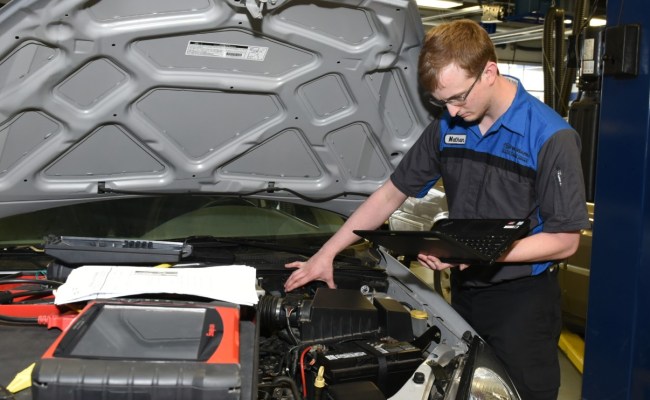
A technician automotive is a person who services and repairs automobiles. While technicians can be trained in a specific brand of automobile, they can also work on all brands. The job description of an automotive technician varies from brand to brand, and from one state to the next. They may be able to work with hybrids or electric cars, depending on their education. Typically, automotive technicians work in various repair centers, such as car dealerships or independent shops.
Automotive technician job description
Automotive technicians work in an auto repair shop. They do basic and extensive car maintenance. They also diagnose and order parts for vehicles. The job also requires them to maintain a clean and safe working environment. These professionals may be responsible for training apprentice technicians. While their duties might vary from shop-to-shop, all of them perform the same functions: they inspect vehicles, diagnose problems and order replacement parts. They might also supervise other technicians.

An extensive education in automotive repair is required for auto mechanics. They are expected to present a professional image, provide friendly customer service, maintain records, and work in a fast-paced setting. They also must have experience using air conditioning systems and lubrication equipment. They must also be familiar with the various functions of automobile systems as well as how to repair and diagnose them. A job description for an automotive technician should include details about training, education, experience, and a brief description.
Education requirements
The educational requirements for a career as a technician automobile repair technician vary depending on the training you are interested in. A high school diploma or GED is required. Anyone who has attended a postsecondary program or school before July 1, 2012 must have completed an approved program.
Some employers prefer applicants with a postsecondary education. Although it's not required in all cases, formal training can give you an edge over applicants who don’t have the education. It shows that you have the skills and knowledge to manage the entry-level position. Additionally, it reduces the amount of time spent learning on the job. Employers also want to see candidates who have more training than a highschool diploma. They can be more marketable if the professionals have received additional training in a relevant field.
Career outlook
Many rewarding career opportunities are available to an automotive technician. In addition to repairing automobiles, technicians are often required to explain their findings to customers and recommend new parts and replacements. Technicians should be skilled in both technical and interpersonal skills. After completing their training, many technicians advance into more responsible positions, such as service manager or automotive instructor. This field will only grow as cars become more computerized. Many technicians want to own their own business after finishing their education.

The auto industry started to contract around fifteen years back. Due to financial limitations and the removal of high school auto shop classes, this was caused by a decline in funding. This has now changed. Technicians can be trained in specific fields to earn industry-recognized credentials. Automotive Management Institute's current president was a service technician who worked his way up to senior executive positions. Technicians can expect to work in various settings and make a living while they are employed.
FAQ
How can I fix my automobile as a hobby.
If you are interested in cars, why not take it on as a hobby? It is possible to learn about cars, repair them, purchase parts, or simply enjoy them. If you are looking for something more, it would be an excellent hobby.
But it is not easy to turn this into your full-time occupation. It requires hard work and dedication. You'll also need to invest a lot.
You might not have a compelling reason to get involved in the car industry.
What are the requirements of an automotive technician?
High school graduation or GED is required with excellent grades in English and math. Additionally, you will need to be proficient in reading and writing. The written test will be passed and you will then have to take several practical exams before you can begin work.
How long does it take you to become a great mechanic?
To become a skilled mechanic, you need years of experience and practice. Working under the guidance of a professional mechanic is the best way to learn how repair cars.
You will need to spend some time in a garage to learn as much about cars and mechanics as possible. You'll need to study mechanical engineering books on mechanics and car design.
And you'll also need to attend auto school.
It's crucial to start as soon as possible. You don't have to wait until you are older to start studying automotive technology. Do you want to be a mechanic? Get started today!
Is it hard to get work as an auto mechanic?
Yes, it's possible. Garages often advertise their jobs online and people just apply because it seems fun. If you want to get your foot in the door, you should try applying for a few places and see if they accept student applications. Alternatively, you could ask friends and family if they know anyone who works in the industry. They might be happy to recommend someone.
To be a car mechanic, do you need a degree? Can I do part-time studies?
Although it's not mandatory, a degree can help. Employers prefer candidates who have completed a full degree. It shows that your efforts have been put in and you have succeeded.
This doesn't necessarily mean you can't continue to work while studying. Some universities permit students to do coursework during summer holidays and complete their studies later in a year. Some universities allow students to take part-time classes throughout the year.
Statistics
- 52% of Mechanics in the United States think their salaries are enough for the cost of living in their area. (indeed.com)
- There were 749,900 jobs available for automotive service technicians and mechanics in 2016, which is expected to grow by six percent through 2026. (jobhero.com)
- Apprentice mechanics earn significantly less hourly than mechanics who have completed training, with a median wage of approximately $14.50 an hour, according to PayScale. (jobhero.com)
External Links
How To
How to Become an Auto Technician
An automotive technician is responsible for vehicle maintenance and repair. He/she works in car dealerships as well as auto shops, garages, and service centers. He/she assists customers in fixing their cars, trucks or motorcycles. An automotive technician must have the ability to quickly diagnose and fix problems.
A person who wants to work as an automotive technician should first obtain an associate degree from a vocational school. After completing this program, he/she will need to pass the National Institute for Automotive Service Excellence's (ASE) certification exam. ASE stands for American Society of Mechanical Engineers. There are two sections to the ASE certification test. The first section tests the ability to use mechanical knowledge. The second section tests the ability to apply practical skills. To pass the test you must go to one of the authorized testing facilities. These locations can be found online, or by contacting your local car dealer.
Before becoming an automotive technician, a candidate must pass the test. This process can vary depending on where the applicant lives. For example, some states require candidates to attend a training course, while others allow them to study independently. In addition, some states license technicians immediately after they receive their license, while others wait until they have completed at least six months of employment as an automotive technician.
To become an automotive technician, one must apply at a local dealership. Most new employees work as apprentices after they have been hired. Apprenticeships typically last three years. Students learn basic repair skills such as changing oil and adjusting brakes, changing tires, cleaning spark plugs and inspecting engine compartments. Some students are able to perform more advanced repairs such as replacing shocks and installing air filters. Many schools offer classes during regular hours. Some schools also offer evening classes, if necessary.
Once a student finishes his/her apprenticeship, it is possible to become a Journeyman. Journeymen can spend up to five years learning how major systems work, including transmissions, differentials. They also learn how to adjust steering gear and suspensions. They also learn to perform complex repairs, such as remanufacturing engines, rebuilding transmissions, and troubleshooting electrical components. Many employers prefer to hire Journeymen because they understand the job well.
If a candidate successfully passes the required exams and receives a license, he/she might want to consider starting his/her own shop. The Bureau of Labor Statistics estimates that there were nearly 1.7 million jobs available for automotive mechanics in 2010. This number was expected increase 18% between 2009 - 2020. Candidates who decide to open their own business should be prepared to invest thousands in equipment and supplies.
There are many factors that affect the salary of an automotive technician, such as where they live, their education and experience. A jobless person can expect to make $20,000 per year. Someone with only a high school diploma could earn around $21,000 per year. Earnings for those with an associate's diploma are approximately $24,000/year. Technicians with bachelor's degrees earned about $27,000 per year. And those with master's degrees made around $32,000 per year. Salary increases can be common. A professional who earns less that $30,000 today could reasonably expect a $40,000 increase in the next few decades.